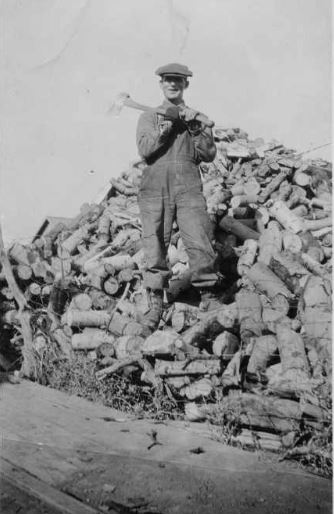Perry Park Lusk


Perry Park Lusk
Perry Lusk was born 31 May 1875 in Malad, Idaho, to parents John Winters Lusk Sr. and Esther Catherine Park. He was born into a polygamous family so he had many full and half siblings. His father had experienced the historic troubles of followers of the Church of Jesus Christ of Latter-day Saints in Nauvoo, Illinois, had crossed the plains, and came to Utah in 1851. He came to Malad, Idaho in 1866 with his wives, living that first winter in a dugout and two wagon boxes. So Perry grew up hearing stories about the pioneer experience.
According to the book, Bannock Valley, “as a young man, [Perry] worked for eight years for his brother-in-law, Lorenzo L. Evans. He worked in the Devil Creek area near the Malad divide during the summer months. In the fall and winter he continued working for Lorenzo feeding cattle on the Bannock Creek Bottoms†(p. 224). The “bottoms,†as they were then called, was the area now covered by the American Falls Reservoir. Lorenzo (“Ren”) Evans was a Bannock Valley (Arbon) homesteader, as was Perry’s older brother John Winters Lusk Jr., so Perry had a lot of connection with Arbon Valley.
Perry married Blanch Elizabeth Wilkes on 22 July 1902 in Malad. Like her husband, she had also been born and reared in Malad. Her parents were Benjamin Morgan Wilkes and Margaret Ann Davis. Elizabeth’s family had a longer association with Malad than most residents at that time, as her mother Margaret had also been born and raised in Malad.
The couple eventually had eleven children: Benjamin Wilkes, 1904; Perry Park Jr., 1905-1907; Caleb F, 1906; Esther Catherine, 1908; Margaret Anna, 1910; John Stanley, 1912; Mildred, 1914; Ruth Edna, 1916; Blanch Elizabeth, 1919; David Reynold, 1923; and Evelyn Fae,1925. All but baby Perry grew to adulthood.
As newlyweds, Perry and Blanch lived in a two-room log cabin in Malad. In 1906 they moved to Arbon Valley and took up a homestead there. Perry’s brother John Winters Lusk had been homesteading there since 1889. Perry bought a farm from Thomas Williams on the West Fork, near the area of Arbon called Pauline. Then he applied for homestead rights on adjoining land.
The Tom Williams ranch had a one-room log cabin with a lean-to kitchen, so Perry didn’t start from raw scratch as his brother had; there was also a log granary and a pole corral. To comply with the homestead requirements on the new land, he built a cabin – but this one was much more elaborate than most homestead cabins. It was a three-room log cabin built in a T-shape, with a small cellar for food storage. The heavy logs were hauled out of Green Canyon by wagon and four head of horses. Later on, as their family grew, two more bedrooms were built on to this cabin. Because of this home’s generous size, it was a gathering place for many neighbors. Perry also built a rough-lumber barn that was considered large for its day. The homestead application papers were completed in 1916.
Perry and his sons were known as very good stockmen. Perry had good stock horses and a Holstein dairy herd that milked as many as twenty cows at a time, twice a day, which took the help of the whole family.
For a time, Perry served as a county commissioner of Power County after the new county was formed in 1913. This service required Perry to ride his horse to the county seat of American Falls, Idaho, about forty miles of bad roads, at least once a month so he could attend his meeting and take care of his official duties. For this he was paid $25 a month.
Blanch served her community as a school trustee for the Pauline School District. All their children attended school in this building up until 8th grade. (This school is still there, in its original location, but added onto and modernized).
The Lusk Ranch, along with other holdings in the West Fork area, reverted back to the U.S. government in the late 1930s. The ranchers didn’t have any choice in the matter. The government paid them, but not what many ranchers felt their holdings were worth. Then to add insult to injury it took some more arguing to finally get their money from the government. The land reverted back to the Shoshone-Bannock Reservation. Perry and Blanch then bought the original Bonanza Bar Ranch on the Snake River eighteen miles west of American Falls, and continued to ranch there.
Perry Park Lusk died 21 July 1941 at the Bonanza Bar Ranch at age sixty-six. He was buried in Malad. Blanch lived over two decades longer. She died 4 May 1964 in the hospital in Rupert, Minidoka, Idaho, and was also buried in Malad.
Sources:
Ward, Laurie Jean, Bannock Valley (Providence, Utah: Keith Watkins and Sons, 1982)
https://www.familysearch.org/tree/person/details/KWZF-M87
https://www.findagrave.com/memorial/81218198
Links provided here will lead to information for other family members.
